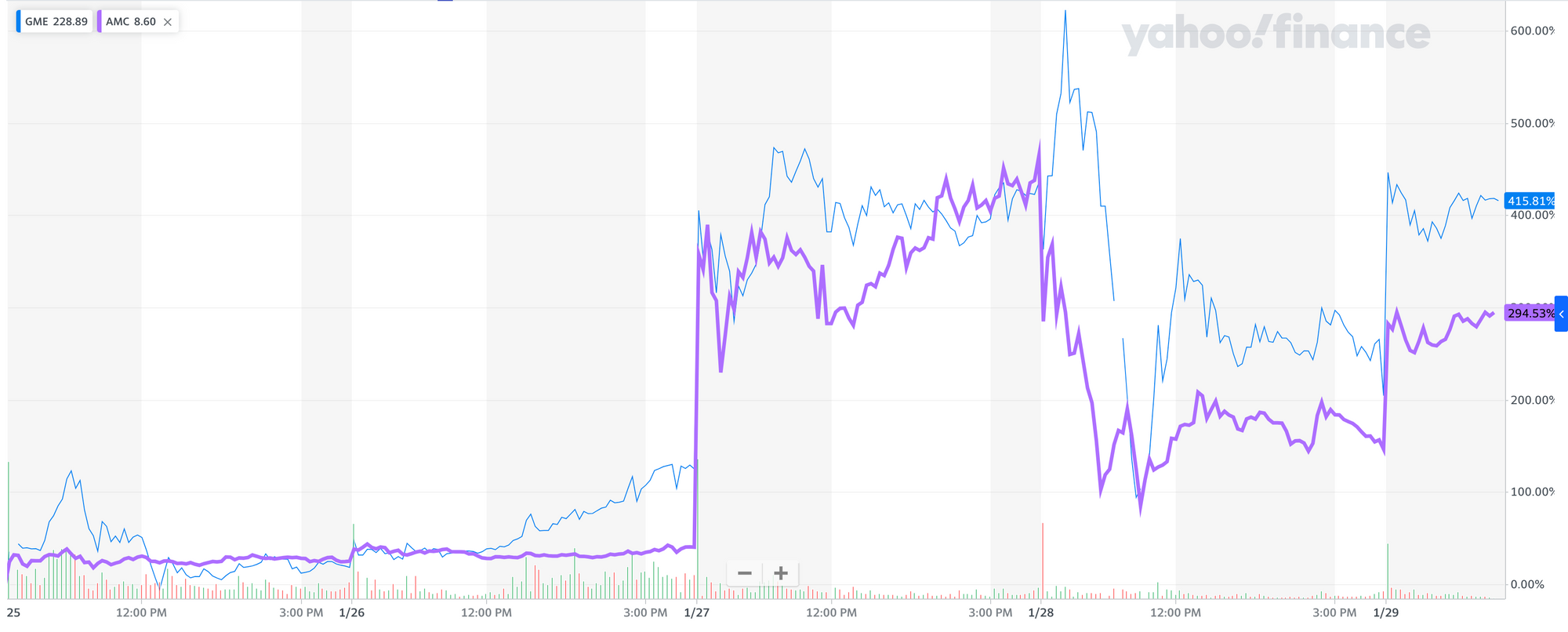Do You Own Your Stocks?
This week has exposed the cracks in our financial system.
In case you haven’t been following, here’s a quick summary: a group of retail traders used a subreddit called wallstreetbets to buy a bunch of highly shorted stocks. Here are the charts of Gamestock ($GME) and AMC Theatres ($AMC) over the last week:

The number on the right side of the screen is the percent increase in price over the last five days. It’s been a wild ride.
Yesterday, a brokerage app called Robinhood halted trading and began to close out the positions of its users. I wanted to expand a bit on what is going on here and what it means for cryptocurrency.
- Robinhood provides a mobile app for users who want to buy and sell stocks. Unlike some other brokerages, Robinhood allows users to do this for free (other companies usually charge a small fee for this service). This has made Robinhood very popular with “retail” investors, a.k.a. non-professionals who want to access the stock market.
- It used to be the case that when you bought a stock you received a piece of paper called a certificate. This made it clear that you owned … something. The certificate was physical proof of your ownership.
- Today, things are less clear. If you use an app like Robinhood you probably don’t own any stock certificates. Instead, you press “Buy” and receive an animation with a confirmation that you now “own” the stock. In reality, you don’t own anything - yet. It takes time for Robinhood to process your trade, even though they show the order completing instantly.
- In the meantime, Robinhood is taking on risk. It takes around two days for these purchases to clear. This is called a T+2 Settlement and it’s the reason why Robinhood shut down trading this week. If a large number of Robinhood users decided to buy shares for $100, then the price of the shares fell to say, $10, Robinhood is on the hook if the users don’t cough up the money.
- Lots of these complications arise from the fact that our financial infrastructure is routed through old-school “clearinghouses” — giant corporations that help secure financial transactions between buyers and sellers from businesses like Robinhood. The biggest clearinghouse, the Depository Trust and Clearinghouse Corporation (DTCC), settled $1.7 quadrillion in 2011.
- If that number seems odd to you that is good because it seems strange and vaguely abstract to me as well. The number 1.7 quadrillion is usually reserved for measurements of molecules or the number of grains of sand on the planet, but no, it’s actually the dollar value that flowed through this company in a single year.
- The issue with our system is that we’ve traded independence for convenience. Instead of owning stocks, we allow companies like Robinhood to hold them on our behalf because it’s simpler.
- If you’re buying stocks or cryptocurrency on Robinhood, you should know that you do not own the underlying asset. Try to transfer the stock or crypto out of the app and see how easy the process is compared to buying.
- Our existing financial infrastructure has made it difficult for retail investors to meaningfully participate in the stock market. You either go through a traditional broker (and eat the fees) or use a service like Robinhood that front-runs your trades to make money on the spread.
- Cryptocurrencies offer a way for retail investors to own the underlying asset they are purchasing. Holding your crypto through an app like Robinhood means that you don’t have the power to move it elsewhere if you want. Instead, you’re required to liquidate to USD in order to use it to make a purchase or exchange it with another person.
- Some apps, like Coinbase and Cash App, allow you to transfer your crypto to a non-custodial wallet. This is important because no one, not even the government, can seize funds from a non-custodial cryptocurrency wallet. If you are holding your crypto on an app, you should know the tradeoffs you are making.
I didn’t participate in the madness this week, but I am fascinated by the implications.
I’m not optimistic that the current system will change, but I believe that crypto offers a path forward for those willing to learn.